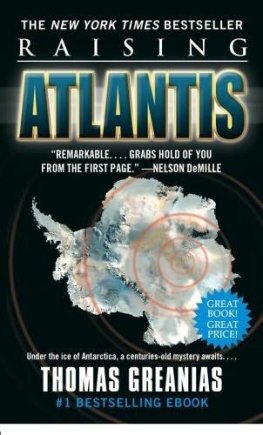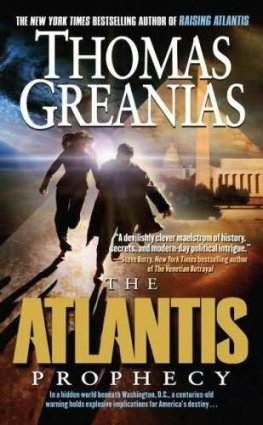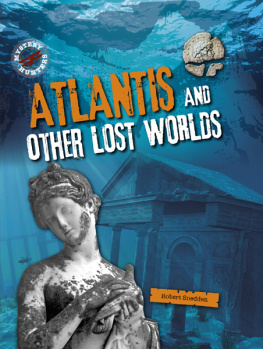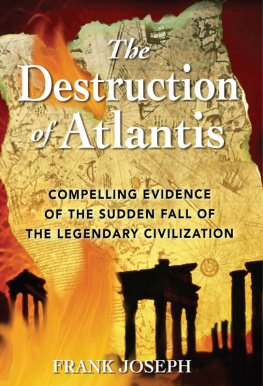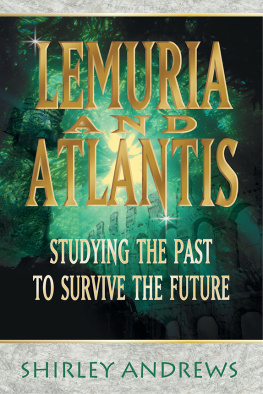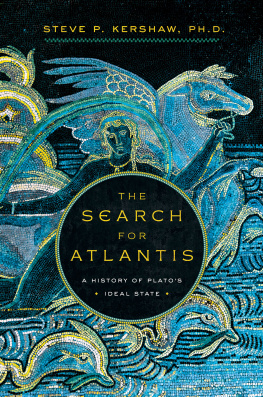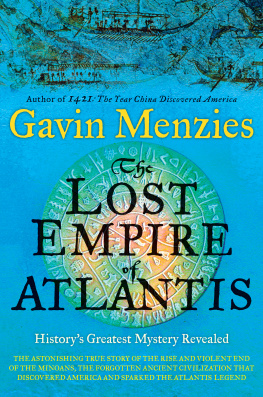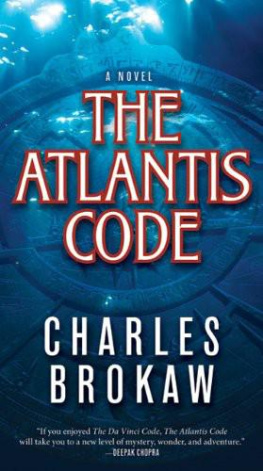Raising Atlantis
Thomas Greanias
Nothing lasts long under the same form. I have seen what once was solid earth now changed into sea, and lands created out of what was ocean. Ancient anchors have been found on mountaintops.
- Pythagoras of Samos, Greek mathematician (c.582-c.507B.C.)
In a polar region there is continual disposition of ice, which is not symmetrically distributed about the pole. The earths rotation acts on these unsymmetrically deposited masses, and produces centrifugal momentum that is transmitted to the rigid crust of the earth. The constantly increasing centrifugal momentum produced this way will, when it reaches a certain point, produce a movement of the earths crust over the rest of the earths body, and this will displace the polar regions toward the equator.
- Albert Einstein, U.S. physicist (A.D. 1879-1955)
Discovery Minus Six MinutesEast Antarctica
Lieutenant-Commander Terrance Drake of the U.S. Naval Support Force, Antarctica, paced behind a snow dune as he waited for the icy gale to pass. He badly needed to take a leak. But that would mean breaking international law.
Drake shivered as a blast of polar air swept swirling sheets of snow across the stark, forsaken wasteland that seemed to stretch forever. Fantastic snow dunes calledsastrugi rose into the darkness, casting shadows that looked like craters on an alien moonscape. Earths last wilderness was a cold and forbidding netherworld, he thought, a world man was never meant to inhabit.
Drake moved briskly to keep himself warm. He felt the pressure building in his bladder. The Antarctic Treaty had stringent environmental protection protocols, summed up in the rule: Nothing is put into the environment. That included pissing on the ice. He had been warned by the nature geeks at the National Science Foundation that the nitrogen shock to the environment could last for thousands of years. Instead he was expected to tear open his food rations and use a bag as a urinal. Unfortunately, he didnt pack rations for reconn patrols.
Drake glanced over his shoulder at several white-domed fiberglass huts in the distance. Officially, the mission of the American research team was to investigate unusual seismic activity deep beneath the ice pack. Three weeks earlier the vibes from one of those subglacial temblors had sliced an iceberg the size of Rhode Island off the coast of East Antarctica. Floating off on ocean currents at about three miles a day, it would take ten years to drift into warmer waters and melt.
Ten years, thought Drake. Thats how far away he was from nowhere. Which meant anything could happen out here and nobody would hear him scream. He pushed the thought out of his mind.
When Drake first signed up for duty in Antarctica back at Port Hueneme, California, an old one-armed civilian cook who slopped on the mystery meat in the officers mess hall had suggested he read biographies of men like Ernest Shackleton, James Cook, John Franklin and Robert Falcon Scott-Victorian and Edwardian explorers who had trekked to the South Pole for British glory. The cook told him to view this job as a test of endurance, a rite of passage into true manhood. He said a tour in Antarctica would be a love affair-exotic and intoxicating-and that Drake would be changed in some fundamental, almost spiritual way. And just when this hostile paradise had seduced him, he was going to have to leave and hate doing so.
Like hell he would.
From day one he couldnt wait to get off this ice cube. Especially after learning upon his arrival from his subordinates that it was in Antarctica that the old man back in Port Hueneme had lost his arm to frostbite. Everyone in his unit had been duped by the stupid cook.
Now it was too late for Drake to turn back. He couldnt even return to Port Hueneme if he wanted to. The navy had closed its Antarctica training center there shortly after he arrived in this frozen hell. As for the one-armed cook, he was probably spending his government-funded retirement on the beach, whistling at girls in bikinis. Drake, on the other hand, often woke up with blinding headaches and a dry mouth. Night after night the desertlike air sucked the moisture from his body. Each morning he awoke with all the baggage of a heavy night of binge drinking without the benefits of actually having been drunk.
Drake shoved a bulky glove into his pocket and felt the frozen rabbits foot his fiance, Loretta, had given him. Soon it would dangle from the rearview mirror of the red Ford Mustang convertible he was going to buy them for their honeymoon, courtesy of his furloughed pay. He was piling it up down here. There simply was no place to blow it. McMurdo Station, the main U.S. outpost in Antarctica, was 1,500 miles away and offered its two hundred winter denizens an ATM, a coffeehouse, two bars, and a male-female ratio of ten-to-one. Real civilization was 2,500 miles away at Cheech-Christchurch, New Zealand. It might as well be Mars.
So who on earth was going to see him paint the snow?
Drake paused. The gale had blown over. At the moment, the katabatic winds were dead calm, the silence awesome. But without warning the winds could come up again and gust to a deafening 200 mph. Such was the unpredictable nature of Antarcticas interior snow deserts.
Now was his chance.
Drake unzipped his freezer suit and relieved himself. The nip of the cold stung like an electric socket. Temperatures threatened to plunge to 130 below tonight, at which point exposed flesh would freeze in less than thirty seconds.
Drake counted down from thirty under his foggy breath. At T minus seven seconds he zipped up his pants, said a brief prayer of thanks, and looked up at the heavens. The three belt stars of the Orion constellation twinkled brightly over the barren, icy surface. The kings of the East, as he called them, were the only witnesses to his dirty deed. Wise men indeed, he thought with a smile, when suddenly he felt the ice rumble faintly beneath his boots before fading away. Another shaker, he realized. Better get the readings.
Drake turned back toward the white domes of the base, his boots crunching in the snow. The domes should have been a regulation yellow or red or green to attract attention. But attention was not what Uncle Sam wanted. Not when the Antarctic Treaty barred military personnel or equipment on the Peace Continent, except for research purposes.
Drakes unofficial orders were to take a team of NASA scientists deep into the interior of East Antarctica, charted by air but never on foot. They were to follow a course tracking, of all things, the meridian of Orions Belt. Upon reaching the epicenter of recent quakes and building the base, the NASA team immediately began taking seismic and echo surveys. Then came the drilling. So the research had something to do with the subglacial topography of the ancient landmass two miles beneath the ice.
What NASA hoped to find buried down here Drake couldnt imagine, and General Yeats hadnt told him. Nor could he imagine why the team required weapons and regular reconn patrols. The only conceivable threat to the mission was the United Nations Antarctica Commission (UNACOM) team at Vostok Station, a previously abandoned Russian base that had been reactivated a few weeks earlier. But Vostok Station was almost four hundred miles away, ten hours by ground transport. Why NASA should be so concerned about UNACOM was as much a mystery to Drake as what was under the ice.
Whatever was down there had to be at least twelve thousand years old, Drake figured, because hed read someplace thats how long ice had covered this frozen hell. And it had to be vital to the national security of the United States of America, or Washington wouldnt risk the cloak-and-dagger routine and the resulting international brouhaha if this illegal expedition were exposed.

